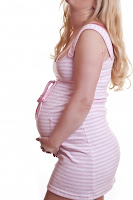Pregnancy in women with kidney disease
Pregnancy is a physiologic stressor on a woman's body. The cardiac output has to increase to keep up with the increased metabolic demands of the woman and the developing fetus. The blood flow to the kidneys increases. Changes in blood electrolyte and acid levels occur. These changes, among others, have implications for both the kidney's function, as well the state of the pregnancy. Hence, nephrologists typically try to answer two questions when assessing these issues:
1) How does kidney disease affect the chances of getting pregnant, and kidney disease's effect on pregnancy?
2) What effects does pregnancy have on the status of your underlying kidney disease?
Continuing on my last discussion about sexual and reproductive issues in people with kidney disease, lets carry this forward.
WHAT IS THE EFFECT OF KIDNEY DISEASE ON PREGNANCY?
Chronic Kidney Disease (CKD) does affect your ability to get pregnant. The frequency of conception decreases with advancing kidney disease, and is inversely proportional to its severity. In women whose kidney disease is advanced to the point where dialysis is required, the frequency of a successful conception is only about 0.5% per year.
Once conception occurs in women with kidney disease, it is usually considered a "high risk pregnancy". This is due to the increased risk of adverse events both for the mother and the developing baby. Such women are almost twice as likely to deliver a premature baby. The frequency of intrauterine growth restriction and still births is higher as well. A major determinant of the outcome of pregnancy in women with kidney disease is the blood pressure (the other being the degree of decline in kidney function, more specifically a creatinine level that is higher than 1.5), which can typically worsen in women with underlying kidney disease. Pregnant women with uncontrollled high blood pressure have a lower chance of survival of the baby to full term.
Any woman needs to be careful about medications that she takes during pregnancy. However, special attention needs to be paid to a particular class of blood pressure medications that many women with kidney disease are very likely to be on. These medications are the ACE inhibitors (eg. lisinopril, enalapril), and angiotensin receptor blockers (eg. losartan, telmisartan). These medications are known to cause fetal abnormalities and should be discontinued as soon as you find that you are pregnant. Your nephrologist can suggest alternative medications that wouldn't be toxic to the baby.
Managing kidney disease and/or dialysis during pregnancy is complex, and should be coordinated between the nephrologist and obstetrician. Fortunately, with changes in treatment and clinical practice over the years, the chances of carrying a pregnancy to full term with a normal baby, (even though lesser than a woman with no kidney disease) have markedly increased. The availability of kidney transplantation has been a big factor leading to these improvements as well. Even though women with a kidney transplant have higher rates of hypertension and preeclampsia (high blood pressure, protein in the urine, edema), they still do better. So, just like a tremendous improvement in other problems of sexual health, the outcomes of pregnancy are markedly better in women who get a kidney transplant, as opposed to women who are on dialysis. Hence, deferring pregnancy till you have a functioning transplant (it is recommended that you wait 1-2 years after transplant), if possible, should be strongly considered.
 |
|
WHAT IS THE EFFECT OF PREGNANCY ON KIDNEY DISEASE?
Due to the immense physiologic changes taking place during pregnancy, the kidneys' function could be adversely affected, and women with underlying disease are at risk. The rule of thumb is that, the more severe the kidney disease to begin with, the more likely is it to worsen with pregnancy. High blood pressure, edema/swelling, and proteinuria are well known changes that could develop, and manifest as an entity called "preeclampsia". Women with preeclampsia are at risk of seizures during pregnancy, in which case the disease is called "eclampsia".
Some of the above changes resolve after pregnancy, but sometime, women with underlying kidney disease could see a permanent decline in their kidney function and consequent worsening of their kidney disease after pregnancy. Again, the chances of this happening are directly proportional to the severity of preexisting kidney disease. In women whose pre-pregnancy creatinine is >1.5, up to one-third will see a permanent accelerated decline in their kidney function from the effects of the pregnancy.
If you are aware of having underlying kidney disease when you discover you are pregnant (especially if your eGFR has been reported as less than 60 on routine tests), you should seek a referral to a nephrologist, and make sure your care is coordinated with your ob-gyn.
Veeraish Chauhan, MD, FACP, FASN


Comments
Post a Comment